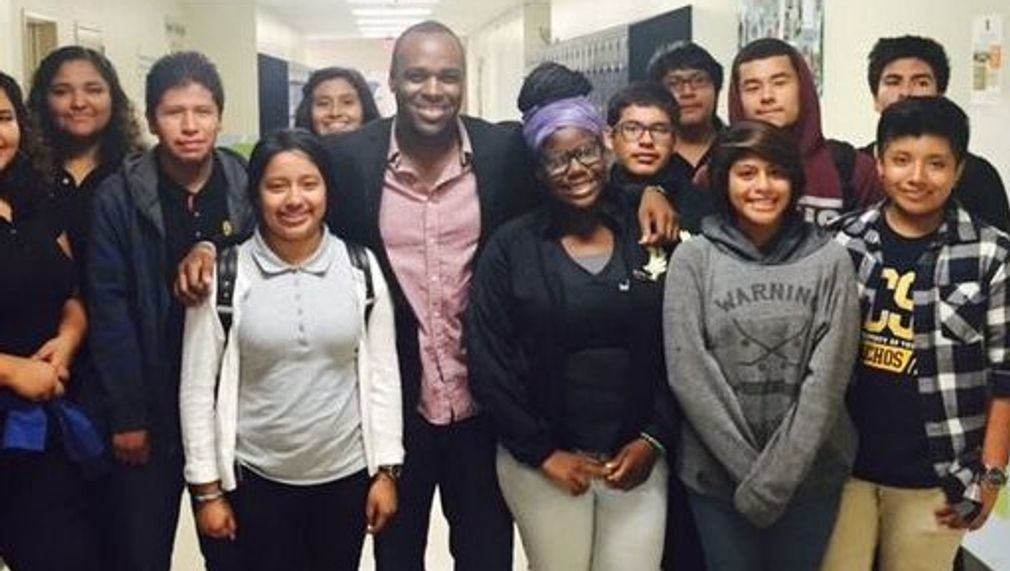YOUTH BUSINESS ALLIANCE
The YBA runs an after school program for disadvantaged high school juniors called "Introduction to Business & Careers." The year-long course is highly experiential for the students and includes: life and business skills training in both soft and hard skills, in-class presentations by business executives, and field trips to area businesses. Additionally, students who successfully complete the course will received a full high school course credit.

In what areas of Los Angeles will you be directly working?
County of Los Angeles
City of Los Angeles
LAUSD
How do you plan to use these resources to make change?
Conduct research
Engage residents and stakeholders
Implement a pilot or new project
Expand a pilot or a program
Mobilize for systems change
How will your proposal improve the following LEARN metrics?
Percent of community college students completing a certificate, degree, or transfer-related program in six years
Youth unemployment and underemployment
District-wide graduation rates
Academic Performance Index* scores
College matriculation rates
Student education pipeline (an integrated network of pre-schools, K-12 institutions, and higher education systems that prepares students for seamless transitions between high school, higher ed
Suspension and expulsion rates (Dream Metric)
Describe in greater detail how you will make LA the best place to LEARN.
The YBA was formed in 2012, servicing one disadvantaged school. We are now in 14 schools serving 350 disadvantaged high school students this year.
The YBA provides a year-long after school course ("Introduction to Business & Careers") to these students. The course description/breakdown is as follows:
1. The course meets every week for two hours for an entire year.
2. The first hour of each 2 hour meeting has the instructor teaching the students about business/careers/entrepreneurship from a textbook (Careers for the 21st Century). In addition, students learn both the fundamental soft and hard skills a young professional will need to know to succeed in their future job or business. Students are taught critical elements such as how to communicate as a professional, resume writing, business plan development, and even participate in experiential exercises like a stock market trading game or a Shark Tank type pitch workshop.
3. The second hour of each 2 hour meeting has a different Guest Speaker from the business community presenting their life journey to the class.
a.These Guest Speaker presentations include their childhood, high school, college, career and industry.
b. In general, the Guest Speaker presentations are approximately 40 minutes along with 20 minutes of Q&A.
c.The Guest Speaker program allows for these underprivileged students, most of whom have never met a single professional, aside from their teacher, to meet approximately 35 Guest Speakers over the course of the year. We have already seen some internships happen organically through the program.
4. The YBA takes each class of students on 1-2 field trips per year to local area businesses. What an impact it makes for our students to get out of the classroom and see a thriving company up close and personal. We've had teachers who have told us that after these field trips, some of their students are so inspired they pick up their grades almost immediately. Past field trips have gone to Google, SpaceX and StartEngine (a technology incubator in Santa Monica).
5. We are currently working on developing an additional element to YBA – A Summer Internship Program. This way our students can put the skills they have learned to use and gain valuable experience, not to mention earn some money in their pocket. Most importantly, the internship serves as a crucial springboard to catapult them into college and beyond.
Please explain how you will evaluate your work.
We will evaluate our work through:
1. Student Surveys. YBA students will take a survey at the beginning of the program and at the conclusion to measure the program's effectiveness.
2. Teacher/Couselor Feedback.
3. Attendance and Persistence Rates
4. Student GPA's
5. Disciplinary and Suspension Rates
5. High School Graduation Rates
6. College Acceptance Rates
7. College Attendance Rates
8. Job Shadow/Internship Rates
How can the LA2050 community and other stakeholders help your proposal succeed
Money (financial capital)
Volunteers/staff (human capital)
Publicity/awareness (social capital)
Infrastructure (building/space/vehicles, etc.)
Education/training
Technical infrastructure (computers, etc.)
Community outreach
Network/relationship support
Quality improvement research